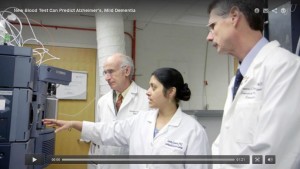Are we ready for a blood test predicting Alzheimer’s?
 This is GREAT!
This is GREAT!
After all, it casts light on what we need–greater awareness of dementia, which was identified recently as the third leading killer behind heart disease and cancer.
Not so fast.
The research results are great, but what do we do with them?
Since the nineties when I jumped into this field with both feet and became a national family caregiver spokesperson (I was told others were not speaking publicly), there has been a STIGMA of DEMENTIA…it continues nearly two decades later.
Researchers from Georgetown University, the University of California at Irvine, and four other institutions identified ten lipids (fats) in our blood that can predict mild cognitive impairment (MCI) or Alzheimer’s. Low levels of these biomarkers indicate a strong likelihood (90%) that one will develop one of these forms of dementia within three years.
HYPOTHETICALLY SPEAKING…
Let’s say I ask my doctor to order this test and it shows low levels of these ten fats in my blood. (I started taking medication for high cholesterol, so it’s unlikely I’ll have low lipid levels).
What will I do with the results?
IF I’m seventy years of age or older (age of the study participants), I’ll start getting my affairs in order.
Can I apply for long-term care and in good conscience deny there’s anything wrong because the researchers promise to keep the results private? That’s a question of integrity. If two people have an affair and promise to keep it a secret …? Well, we know how that often ends.
Let’s take this hypothetical “What if…?” a step further.
What happens when I share the test results with my friends and family?
Driving: Brenda, how about if I drive, today? Tomorrow? Next week? Everyday?
Investing: Ahhh, Brenda, are ya’ sure you can keep up with all that information? I mean that’s a lot of money to risk.
Girls’ Time Out at a Tropical Destination: (Still waiting to fulfill this goal.) Hmmm, I’m not sure I’m able to join you. (What I really mean is: I’m afraid with your dementia, you’re going to be too much to handle.)
Nothing has changed, since the diagnosis except for people’s reactions; and hence the STIGMA.
Just like cancer and HIV AIDS scared us (Don’t touch, you might catch it.) we need to move beyond this stage to understanding. Lose an arm or a leg, and you’re traumatized for sure, but you can also figure out how to adjust. Lose your brain cells–now that’s a totally different situation. You lose pieces of who you are–your identity.
 Dementia Awareness is key
Dementia Awareness is key
Fifty-something Norman McNamara, living with Lewy body dementia in the UK, launched The Purple Angel [5/7/2025 TCV Update: The URL’s SSL certificate expired leaving the website is inaccessible.] organization for dementia awareness. It’s gotten the attention of the Prime Minister of England and people around the world.
We need to raise awareness and make sure the voices of those who walk with dementia are heard. We can save ourselves a lot of heartache in the future if we pay attention, now.
Years ago, Former First Lady Rosalyn Carter quoted a colleague when she said there are four kinds of people in this world:
- Those who are caregivers
- Those who will be caregivers
- Those who were caregivers
- Those who know caregivers.
Statistically speaking, with 36 million people worldwide living with dementia, no matter how much we try to turn the other way, we’re connected. We must create greater awareness in order for research results to be received warmly and not with the STIGMA today’s pioneers living with dementia endure.
There is one more group of people in the world:
5. Those who will need caregivers.
Which one are you? It’s only a matter of time.
For more information about the new blood test and a brief video, visit these links below then let us know what you think. Let your voice be heard (or at least, seen).
New Blood Test can Predict Alzheimer’s. Mild Dementia – Georgetown University
Blood Test May Predict Early Alzheimer’s Disease – ABC News
[Updated 11/4/2017: Link no longer available]









hELLO, AND NO. tHIS IS ANOTHER OF THOSE HOPE PRODUCING SPECULATIONS THAT ARE CONSTANTLY BEING FED ONE AT A TIME TO THE PUBLIC. iT IS SO FULL OF “MAYBE, PERHAPS, COULD LEAD TO, ETC.” THAT siMPLY TO READ IT ALOUD RUNS THE RISK OF DREAMing of what might have BEEN, WHAT MIGHT BE.” If researchers, the media, and the national alzheimer’s association are not going to screen themselves from shouting press releases, mass media coverage, usage of crumbs of evidence as justifictation for asking for mountains more of donations then we all who face this disability must protect ourselves from these myth makers. rICHARD
Dear Dr. Taylor, and I address you as such since your comment came across with a stuck caps key…or, maybe it was intentional?? Anyway, thank YOU always for your insights “from the other side.”
One day…one day, hope will be answered…hopefully, it will all come together in time for you and the many others who speak and help us better understand what it’s like to live with dementia.
JOE, Make no mistake about it. Caregivers do feel your pain in a different way. No, I do not know what it’s like in your shoes but in my shoes as a caregiver for my wife of 50 years, I do feel her pain as well as mine in seeing this bright, energetic woman go down hill with LBD and Parkinson’s and not even know who she is let alone me, our daughter, son and other relatives. Her friends don’t even keep in touch anymore. Oh yes, they say how are things and I will be over but nope, we have lost all our lives as you have. Again Joe, I feel for you and the others that have gone through the promises. We are starting that journey with LBD and keep praying that God will give us the wisdom to beat these diseases.
My Friend,
Read this post and the related ones. Well I for one see nothing here of value that has not already been discussed in the 10 years I have lived with Alzheimer’s. They found genes and what did that bring about? They found plaque and what did that bring about? We cannot forget the Tau and Amaloyid protiens, they would feel negelected. Sorry but dreams just are not for this disease. They say they validated their info, unfortunately I could not find that. Would love to read it. Caregivers you poor people, come on over to our side. You think you have it bad, we cann’t even figure out what the hell we did this morning.
God Bless You,
joe
Thank YOU, Joe for casting light from your side. Yes, as caregivers, we benefit from seeing the world from your side. After all, we’re in this together!